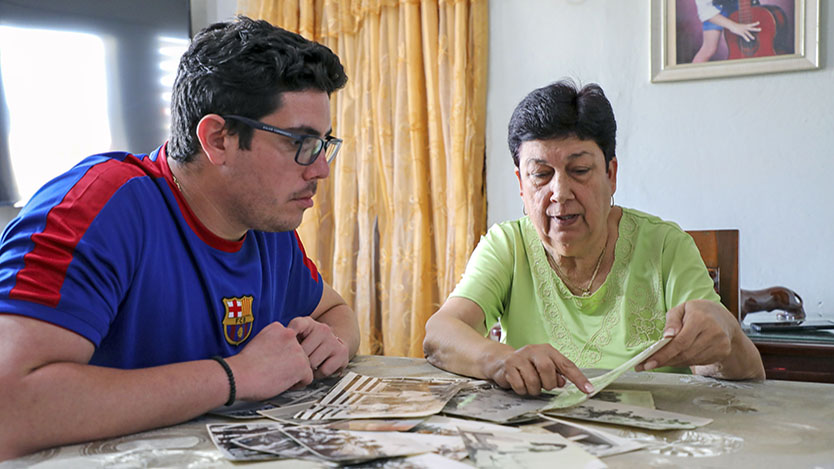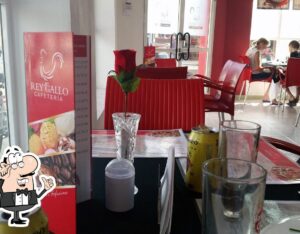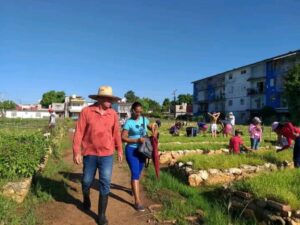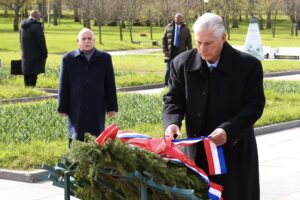They were fishermen who went to the Laguna de Leche and returned home empty-handed. Like old Santiago, the Moronenses had «deep scars from handling the ropes», but none of them recent. Unlike Hemingway’s account in his novel, they were forced to give up long before accumulating eighty-four days with the same fate.
At the beginning of 2005, Magaly Zamora Morejón had gone to accompany a colleague from a radio station in Avila to take statements from the directors of fishing entities about the previous year’s yields.
Then she joined in to write a news report, because it is impossible to stop being a journalist; but she had other responsibilities to fulfil and other audio recordings waiting for her to turn them into articles. During the exchange and later, alone, she boomed out an answer: The opening of the floodgates caused an increase in salinity and fish kills in the island’s largest natural lake.
She knew then that she had to start a thorough investigation, instead of plunging into the routine professional facies of the profession. Magaly had a keen sense of smell, able to distinguish when an issue deserved the most attention. She did the ABCs: interviewing fishermen, the delegate of Water Resources, specialists from the Ministry of Science, Technology and Environment… and gathering as much information as possible from scientific literature, newspapers and the Internet. That was only a part of the whole, before he plunged completely into writing.
On 29 January 2005, page four of the Invader newspaper read: «In the Laguna de la Leche there is an alarming calm. The waters are still and dark at the edge of the jetty, without the bubbling that the catfish used to produce when they came to the surface to take in oxygen, nor are the men unloading the crates of fish. There are almost no fish. Life retreats like a bad omen».
This was the beginning of the report «No treasures in the lagoon», which won her so many provincial and national awards. Magaly swims in memories after finding the clipping of her publication in perfect condition.
In a cardboard envelope she keeps some of her texts of relevance. Among others, a rather controversial report entitled ¿Quién le pone el cascabel al cerdo? and an interview with Un hombre con mucha suerte, enough to survive a firing squad. He also keeps in boxes the photos of old coverage of the inauguration of hospitals, hotels and educational centres, where he coincided with Fidel and Almeida.
She was the head of the Cuban News Agency (ACN) correspondent in Ciego de Avila for decades, without ever abandoning her work as a reporter. «That’s what I like about journalism, not directing,» she says quietly, but like a shout. He won awards from the ACN’s own Obra de la Vida and the Union of Cuban Journalists in Ciego de Avila. «Somehow you feel that your life, your years of work, have not been in vain. It is to recognise that you have not done all bad. My purpose was never to leave a mark or to stand out. Awards give me the idea that I’m getting older,» she laughs. He is 71 years old and has too much ink left, as if he had graduated from the University of Havana yesterday afternoon.
«Journalists are never finished. I still feel the need to write, to give my opinion. I have the satisfaction that I can do it. I still don’t think I’ve done the best work yet. It would be the one where I say: ‘This is my masterpiece’. It hasn’t arrived. Maybe it will never come. I have written investigative reports that have had an impact, but I think I can still do one that has a big impact, that reveals something new, that provokes,» he says with a certain tedium.
His own statements cannot be the reason for his feelings. The discomfort stems from the position she occupies. Magaly has the habit of being the one to ask the questions, but today she is in the interviewee’s seat.
«I don’t really like being interviewed, but how can I say no to a colleague of mine, knowing how difficult it is to get the sources to say yes? It’s good to live the experience from this side, to see how the source might feel at certain times. You always have to put yourself in other people’s shoes.
She still has that interest in delving into stories and finding out the hidden whys and wherefores of reality. Magaly has been a total journalist. She has intact the ability to tackle any genre, and any subject, in record time, without affecting the quality of the work.
In her more than forty years of service to the ACN, she has acquired an unparalleled ability to find the right lead, which is why she is known in the profession as «La magaga de las noticias» (The magician of the news), as well as by her first name.
-If we are talking about journalistic genres, it is necessary to refer to the specialisation you have achieved in writing news articles.
-My training was in an agency and that’s where the news predominates par excellence. It is a challenge to work with agility so that it does not lose immediacy and, at the same time, to write good, quality, comprehensive news, with contrasting sources.
«Commentary is one of my favourite genres, by its very nature. At the beginning there was a plan of 60 news items at the former National Information Agency (AIN). It was very complicated to fulfil. I managed to establish good links with the newspaper (Invasor) and then I wrote the opinion pieces. I really like journalism, which is hard work, because you have to gather a lot of information, check different sources, do a lot of research.
-The agency always, by preference, duty, or both?
-When I graduated with a degree in journalism from the University of Havana in 1977, I was assigned to the AIN in Ciego de Ávila, which had just been founded, just like the province itself, to carry out social service. Immediacy was very important. We worked at 8:00, at 10:00, at night, at any time. First I wrote on the typewriter, then on the TV, which made an infernal noise with its reel of paper and its tape.
«As I was from Florida, Camagüey, I had nowhere to live and had to wait until the following year to join. I started in May, housed in a flat that was set up for this purpose. When I finished my social service, I decided to return to Camagüey, but the director of the AIN convinced me to stay a little longer. When I was ready to make all the arrangements for a permanent transfer, I was appointed head of the Correspondent’s Office. So I stayed because of my commitment and responsibility to the ACN.
-Let’s go back to the beginning, why journalism?
-We have to go back many years before I started studying journalism. I was born in the countryside of Florida. I didn’t have much of a career path. I always liked to read. I read whatever I could get my hands on, even if I didn’t understand everything as a child. I loved to write. In school, my favourite time was writing compositions. I listened to a lot of radio, until the batteries ran out. When I saw the list of majors that made it to pre-university, I opted for journalism. I was adventurous and I thought journalism was like that too. I never wanted to be in an office for eight hours. It was a risky choice, because there were only two places for the whole province. Luckily, I made it.
«When I came to Havana to study, I really got immersed in journalism. I had my ups and downs, but I never regretted it. All my professors were extraordinary. Getting to know the cultural life of Havana was a dazzling experience. Staying was difficult, because I had no family there. That’s why it was really traumatic to start my working life in an unknown province like Ciego de Ávila. Those were hard years. I had no relations, I didn’t know any address, there were no conditions. Nothing.
-Why did you continue to choose it?
-Work is ephemeral. When you finish one, the other begins. You don’t have time to rest. I’m cooking or doing whatever and thinking about how to face the blank page. When I write the first paragraph, the rest flows. Before maybe I was freer, more poetic… That’s been my day to day life.
«It doesn’t bore me, it doesn’t tire me. I can get tired at certain times of what surrounds journalism, but not of journalism. Sometimes I’ve gone to bed late, I’ve gone without lunch, because of writing. You have to give yourself to journalism. As García Márquez said, here you suffer a lot. But I have also enjoyed it. I have not done journalism out of obligation.
-Did you have to tackle different subjects, even distant ones? Was it due to the demands of the media or professional interests?
-During my time in Havana as a student, I was inserted in the cultural section of Juventud Rebelde. I shared the editorial staff with Alejandro Alonso and Soledad Cruz, who were eminent figures. I had the opportunity to interview great artists during festivals. I remember Omara, Silvio, César Portillo.
«Here, in Ciego de Ávila, cultural life was more limited, but I started writing about those subjects. The buts came later, because we needed more news on agriculture, society, the economy, even sports. I’ve written about everything, practically».
-How was your relationship with censorship?
-There have been more difficult times than others, none of them have been easy. When you set out to talk about a subject, there are many ways to get to it. I think there is a lot of self-censorship. It shouldn’t happen that a journalist doesn’t write about a subject because he or she doesn’t want to be singled out or get into trouble, or because he or she thinks it won’t be published.
«One also earns respect in order to be able to address what interests you. You don’t betray a source, you respect them. Even if you are in a hurry to publish the story, you always have to verify the facts. Journalism cannot be improvised. Have proof that the truth belongs to you. I didn’t feel censorship; I dared. I wasn’t a civil servant. My duty was and is to the readers.
-What did you fail to do?
-But I think I did what circumstances allowed me to do. I am left with dissatisfactions, of course. For example, I gave my willingness to be a war correspondent in Angola. Almost everyone in my group and my generation went. I would have liked to do that kind of journalism, to have been an internationalist.
-What question would never be missing from your questionnaire if you were interviewing a journalist?
-How do you assess journalism today?
-How do you value journalism today?
-Today’s journalism is comfortable. Before, I think, journalists took more risks. I feel that journalists have given way, while regulatory mechanisms continue to gain ground. We have to be more incisive in defending the right to write. I must also say that I have seen some very good writing. The best journalism, today, is being done in provincial media.
«To the young people who are starting out, I would only ask them to respond to their time and to take advantage of the weapons they have at their disposal. And to always be humble. Nobody knows everything in journalism. I am still learning. Credit and recognition is earned through hard work.




